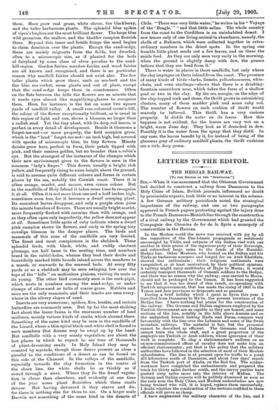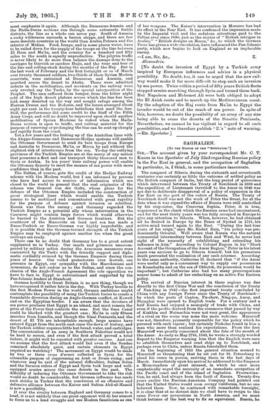THE HEDJAZ RAILWAY.
Sru,—When it was announced that the Ottoman Government had decided to construct a railway from Damascus to the Holy Cities of Islam, British journals, influenced no doubt by pessimistic experts, took little or no interest in the scheme. A few German military periodicals noted the strategical importance of the railway, and one or two paragraphs appeared in French papers protesting against the injury done to the French Damascus-Mezerib line through the construction
of a rival railway by the Government which had granted the Compagnie des Chemins de fer de la Syrie a monopoly of construction in the Hauran.
In the Moslem world the news was received with joy by all the supporters of the Pan-Islamic propaganda so sedulously encouraged by Yildiz, and subjects of the Sultan vied with one another in their praise of the sagacious piety of their Sovereign, and subscribed large sums to the funds of the Hamidie- Hedjaz line. Other Moslems, who looked on the Sultan and his Turks as barbarous usurpers and longed for an Arab Ithalifate, showed less enthusiasm : their religious sentiments were vanquished, or at least neutralised, by their political opinions. A railway might carry multitudes of Hajis to Mecca ; it would certainly transport thousands of Osmanli soldiers to the Hedjaz, and there was no reason why the railway, once carried to Mecca, should not be prolonged to the Yemen. It has been suggested to me that it was the dread of this result, co-operating with Turkish misgovernment, that has made the rising of 1905 in the Yemen and Azir provinces so desperate and so general. During a brief holiday which I spent in Syria this year I travelled from Damascus to Ma'an, the present terminus of the Hedjaz line. I have nothing but praise for the construction of the railway. The German and Italian engineers employed by the Turkish Government are as capable as they are honest, and some sections of the line, notably in the hills above Amman and on the unfinished branch linking Haifa and Deraa, compare very favourably with the line over the Lebanon and some of the Swiss mountain railways. The material is fair, but the personnel cannot be described as efficient. The Germans and Italians cannot train the whole staff, and a great proportion of the employes are Turkish or Arab soldiers, whose ignorance of their work is complete. To clap a stationmaster's uniform on an ex-non-commissioned officer of cavalry does not make him an efficient stationmaster; yet that is the policy that the military authorities have followed in the selection of most of their Moslem subordinates. The line is at present open for traffic to a point 475 kilometres south of Damascus, and about four days' march from the Turkish port of Akaba, on the Red Sea. The soldier- workmen have completed the embankments and prepared the track for thirty miles further south, and the survey parties have pushed sixty miles more into the interior of Midiaii. The German and Italian experts will be politely dismissed as soon as the rails near the Holy Cities, and Moslem understudies are now being trained who will, it is hoped, replace them successfully. I doubt whether the construction of the sections confided to these officials will prove as cheap.
I have emphasised the military character of the line, and I
must emphasise it again. Although the Damascus-Amman and the Haifa-Deraa sections run through some extremely fertile districts, the line as a whole can never pay. South of Amman a rocky wilderness succeeds a barren steppe, and there are few more desolate countries in the world than Arabia Petraea and the interior of Midian. Food, forage, and in some places water, have to be railed down for the supply of the troops on the line between El Hasa and Ma'an, and the country for a hundred and fifty miles to the south is equally unproductive. The pilgrim traffic is never likely to do more than balance the damage done to the carriages by thievish or careless Hajis, and the wear and tear of the line and rolling-stock during the months of the Haj. But in the last week of February and the first fortnight or so of March over twenty thousand soldiers, two-thirds of them Syrian Moslem reservists, were entrained at Damascus and Amman, and marched across the desert to Akaba. There were admitted defects in the mobilisation, and accidents on the railway were only averted, say the Turks, by the special interposition of the Prophet. The men suffered from hunger, from the bitter night cold of the high desert plateau across which the line has been laid, many deserted on the way and sought refuge among the Hauran Druses and the Bedouin, and the losses averaged about eight per cent, in the twenty-four battalions that used the line. Still, the performance did some credit to the Staff of the Fifth Army Corps, and will no doubt be improved upon should another mobilisation of Syrian Moslems be risked when the Haifa- Deraa section is open to traffic, and railway material for the purpose of renewing or prolonging the line can be sent up cheaply and rapidly from the coast.
Yet a few years and the linking up of the Anatolian lines with the Aleppo-Damascus and Datnascus-Hedjaz systems will enable the Ottoman Government to send its best troops from Europe and Anatolia to Damascus, Ma'an, or Mecca by rail without the slightest risk of interference from the sea. To-day the outlying provinces of the Turkish Empire are at the mercy of any nation that possesses a fleet and can transport thirty thousand men to Syria or Arabia. In ten years' time railway power will enable the Ottoman dynasty to meet the menace of sea power with more confidence than in the past.
The Sultan, of course, gets the credit of the Hedjaz Railway scheme with the Moslem world, but I am informed by persons who have had access to sources of information which are closed to the world in general that the real originator of the scheme was General von der Goltz, whose plans for the defence of the Ottoman Empire included the construction of great strategical lines which would enable the Turkish armies to be mobilised and concentrated with great rapidity for the purpose of defence against invasion or rebellion. Russia was then the enemy ; and Germany regarded the Turkish Empire as a potential ally whose intervention in the Caucasus might contain large forces which would otherwise be hurried to the Austrian and German frontiers. But the .overthrow of the Muscovite on land and sea has made a Russo-Turkish or Russo-German war highly improbable, and it is possible that the German-trained strength of the Turkish Empire may be employed against another foe when the great railways are ready.
There can be no doubt that Germany has to a great extent supplanted us in Turkey. Our snarls and grimaces unaccom- panied by military action during the Armenian massacres were contrasted by the Turks with the friendly support and diplo- matic cordiality evinced by the German Emperor during those years of horror. Our veiled protectorate over Koweit, our presence in Egypt, our sympathy with the Macedonians and Armenians, do not endear us to the Sultan, and since the con- clusion of the Anglo-French Agreement the sole opposition we
• have to face in Egypt is subventioned and supported by the Pan-Islamic leaders at Stamboul.
German hostility to Great Britain is no new thing, though we have recognised it rather late in the day. With Turkey hostile to the first Moslem Power in the world, German ambitions might contemplate the possibility of using the Turkish forces to create a formidable diversion during an Anglo-German conflict, at Koweit and on the Egyptian border. I am aware that the devotees of sea power proclaim that Egypt is an island, and must remain the prize of the Power that controls the seas. But the Suez Canal could be blocked with the greatest ease ; Ma'an is only fifteen marches from Ismailia, and though the Sinai Peninsula and the desert of El Tih are inhospitable enough, large armies have entered Egypt from the north-east since the dawn of history, and the Turkish soldier requires little but bread, water, and cartridges. The concentration of an army in Southern Palestine would not be hard to screen, and even if the first attack proved a total failure, it might well be repeated with greater success. And can we assume that the first attack would fail even if the Soudan remained absolutely quiet, and certain elements in Egypt required no watching? The movement on Egypt would be made by two or three corps d'arnsie collected in Syria for the ostensible purpose of suppressing an Arab or Druse rising ; and whatever may be said of the natural difficulties, Sultan Selim and the Saracen rulers of Egypt and Syria took large and well- equipped armies across the same deserts in the past. The difficulty of inducing the Ottoman Government to take the risk would no doubt be considerable, but German influence has made such strides in Turkey that the conclusion of an offensive and defensive alliance between the Kaiser and Sultan Abd-ul-Hamid
• is now a possibility.
If ever the rivalry between England and Germany comes to a head, it is not unlikely that our great opponent will do her utmost to force us to a land struggle and use Moslem fanaticism as one
of her weapons. The Kaiser's intervention in Morocco has had its effect in the Near East. It has confirmed the impression made by the Imperial visit and the sedulous attentions paid to the Sultan ever since 1890, just as the stories of "British intrigue in Arabia," "British designs on Mecca," &c., to which the German Press has given a wide circulation, have influenced the Pan-Islamic party, which now begins to look on England as an implacable enemy.
—I am, Sir, &c., Z.
Alexandria.
[No doubt the invasion of Egypt by a Turkish army inspired by European influences aud advice is a physical possibility. No doubt, too, it can be urged that the new rail- way would make it far more difficult to stop such an invasion by sea power. Twice within a period of fifty years British fleets stopped armies marching through Syria and turned them back. But Napoleon and Mehemet Ali were both obliged to adopt the El Arish route and to march up the Mediterranean coast. By the adoption of the Haj route from Maln to Egypt the invader would be out of the reach of sea power. In spite of this, however, we doubt the possibility of an army of any size being able to cross the deserts of the Sivaitic Peninsula.
Nevertheless, we cannot be too vigilant in regard to all such possibilities, and we therefore publish " Z.'s " note of warning.
—ED. Spectator.]







































 Previous page
Previous page